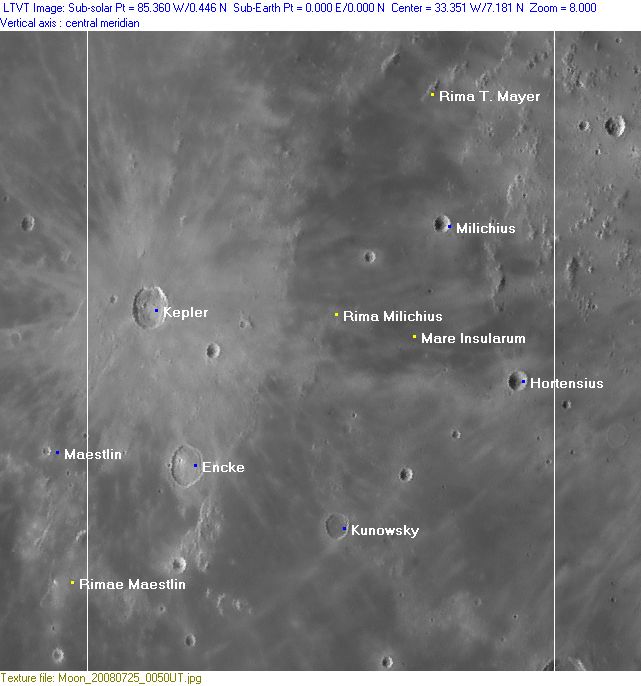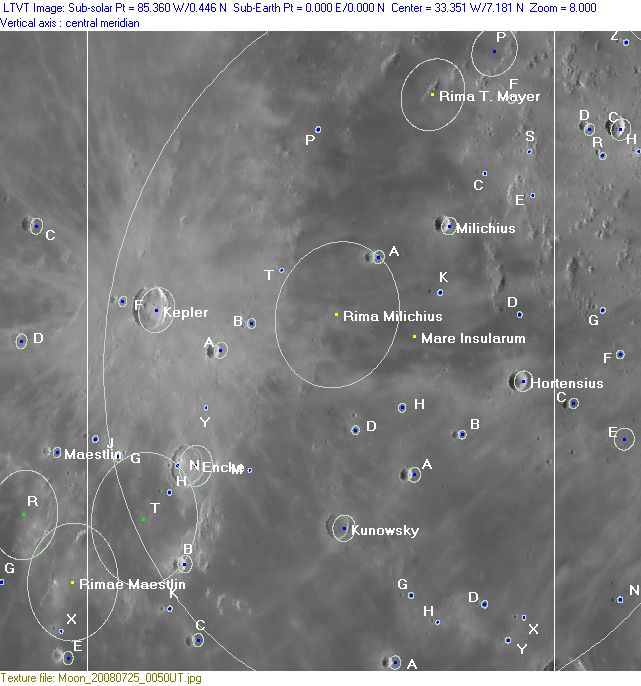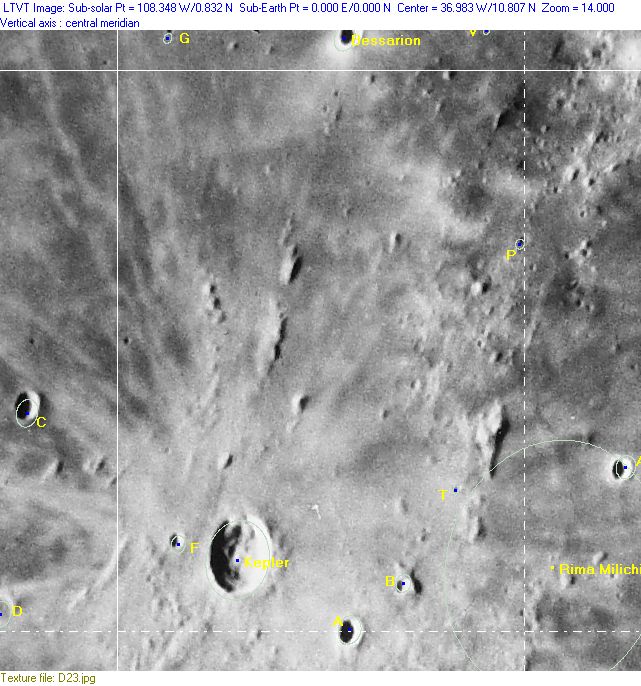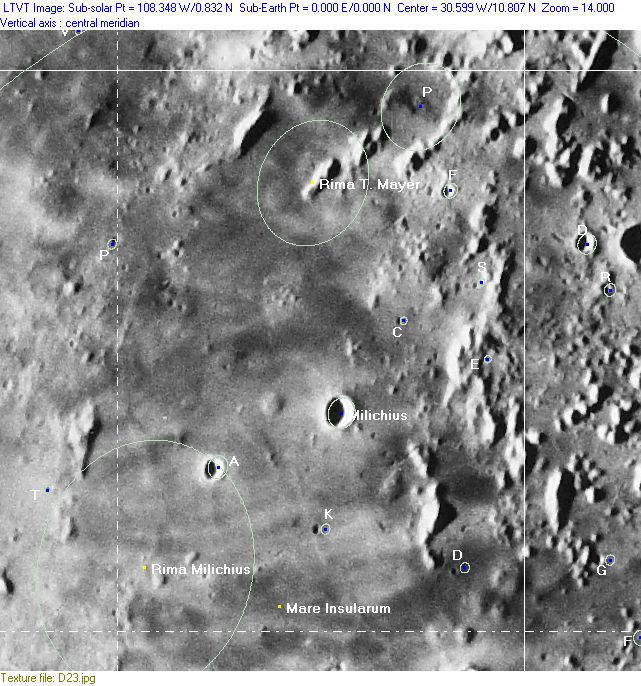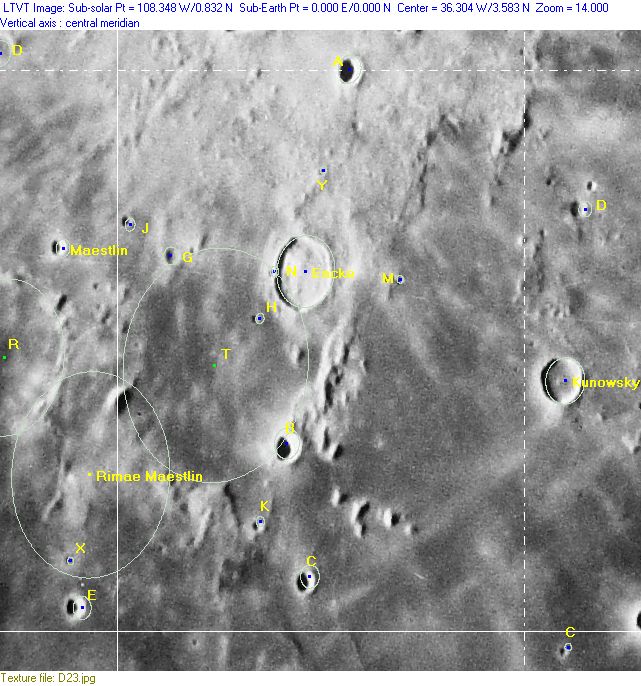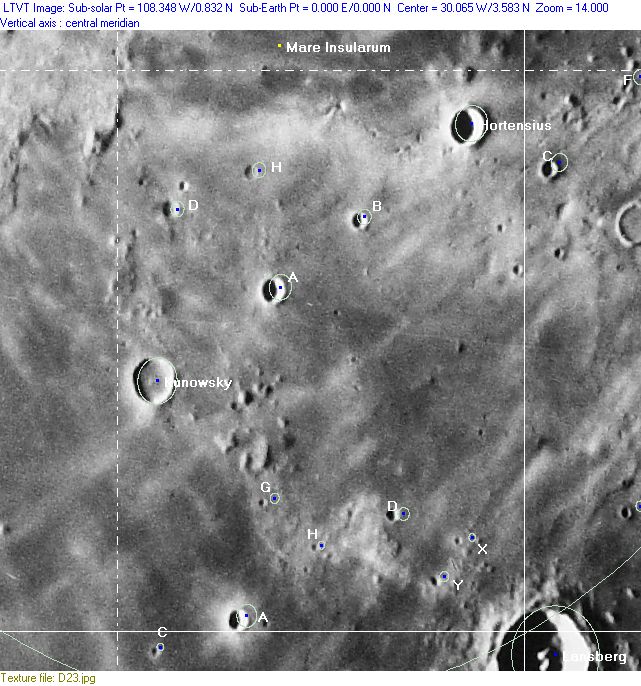Difference between revisions of "Rükl 30"
(Created page with "<div id="content_view" class="wiki" style="display: block"> =Rükl Zone 30 - KEPLER= <br /> Neighboring maps on the [http://the-moon.us/wiki/R%C3%BCkl%20Index%20Map Rükl N...") |
|||
| Line 2: | Line 2: | ||
=Rükl Zone 30 - KEPLER= | =Rükl Zone 30 - KEPLER= | ||
<br /> Neighboring maps on the [http://the-moon.us/wiki/R%C3%BCkl%20Index%20Map Rükl Nearside Map]:<br /> <div id="toc"> | <br /> Neighboring maps on the [http://the-moon.us/wiki/R%C3%BCkl%20Index%20Map Rükl Nearside Map]:<br /> <div id="toc"> | ||
| − | + | ||
| − | |||
{| class="wiki_table" | {| class="wiki_table" | ||
| | | | ||
| Line 82: | Line 81: | ||
==The Triplet at Encke M== | ==The Triplet at Encke M== | ||
| − | * There's an interesting [http://www.lpi.usra.edu/resources/lunarorbiter/images/preview/4138_h1.jpg Triplet] east of [[Encke|Encke]] (with '''Encke M''' in it). At least two craterlets of this triplet are simultaneous impacts. A common or powerful telescope is required to split the row into three craterlets! L.F.Ball, a contemporary English selenographer, seems to have discovered this triplet. <span class="membersnap">- | + | * There's an interesting [http://www.lpi.usra.edu/resources/lunarorbiter/images/preview/4138_h1.jpg Triplet] east of [[Encke|Encke]] (with '''Encke M''' in it). At least two craterlets of this triplet are simultaneous impacts. A common or powerful telescope is required to split the row into three craterlets! L.F.Ball, a contemporary English selenographer, seems to have discovered this triplet. <span class="membersnap">- DannyCaes <small>Nov 11, 2008</small></span> |
<br /> | <br /> | ||
---- | ---- | ||
| − | + | </div> | |
Revision as of 16:48, 15 April 2018
Contents
Rükl Zone 30 - KEPLER
Neighboring maps on the Rükl Nearside Map:
| 30 |
||
Photographic Map
(This map is based on an Earth-based photograph that has been computer-corrected to zero libration. The vertical white lines indicate the left and right boundaries of the Rükl rectangle)
Background image source
Named Features
- Catena Encke (an unofficial name from D.Caes for a small chain of depressions south-southwest of Encke).
- Dorsum Milichius K (an unofficial name from D.Caes for the wrinkle ridge southeast of the bowl-shaped crater Milichius K).
- Encke
- Encke's Triplet (an unofficial name from D.Caes for the curious row of three craterlets east of Encke, see description below).
- Garsioli (Van Langren's disallowed name for Kepler Theta).
- Hortensius (and the Schlumberger domefield north of it) (Van Langren's Gualteri) (?) (E.A.Whitaker seems to be uncertain about that one).
- Insula Anemusa (J.Hewelcke's disallowed name for a bright spot north of Lansberg).
- Insula Cercinna (J.Hewelcke's disallowed name for the outer bright nimbus of Kepler).
- Insula Menyx (J.Hewelcke's disallowed name for the bright area at Kunowsky).
- Insula Ventorum (Riccioli's disallowed name for the high albedo area of ejecta-rays around Kepler) (but wait a minute... so it is depicted on Grimaldi's map (the one with Riccioli's nomenclature), while on the moonmap made by the Dutch moonobserver A.J.M.Wanders in his moonbook Op Ontdekking in het Maanland (1949) it is depicted around... Copernicus) (did Wanders mentioned the reason of this change in his book?).
- Insulae Taraciniae (J.Hewelcke's disallowed name for the nimbus of Hortensius and bright spot to the west of it).
- Kepler (Van Langren's Thomae D. Sab.).
- Kepler Omega (hill immediately north-northwest of Kepler) (see SLC E4) (System of Lunar Craters, 1966).
- Kunowsky (Van Langren's Scialli).
- Lansberg (a very tiny little bit of the northwestern part of this crater's rim is seen at the lower right corner of Chart 30).
- Laucii (Van Langren's disallowed name for Kepler Gamma).
- Loca Paludosa (J.Hewelcke's disallowed name for the inner nimbus of Kepler).
- Mare Insularum
- Milichius
- Milichius Pi (the once official name for the prominent dome immediately west of Milichius) (see page Milichius for photographs of Milichius Pi).
- Quesada (Van Langren's disallowed name for Milichius Gamma, see page 199 of E.A.Whitaker's Mapping and Naming the Moon).
- Rima Milichius
- Rima T. Mayer
- Schlumberger domes (an informal name for the domefield north of Hortensius).
- Sinus Syrticus (J.Hewelcke's disallowed name for the low-albedo area southwest of Encke) (Encke T).
Lettered Crater Locations
(click on the thumbnails to display full-sized images; use browser BACK button to return - the dashed white lines are the midpoints of the Rükl zones)
Full zone with lettered craters:
Lettered craters by quadrants:
| North West |
North East |
| South West |
South East |
Additional Information
- Other online descriptions of features in this Rükl map section:
The Triplet at Encke M
- There's an interesting Triplet east of Encke (with Encke M in it). At least two craterlets of this triplet are simultaneous impacts. A common or powerful telescope is required to split the row into three craterlets! L.F.Ball, a contemporary English selenographer, seems to have discovered this triplet. - DannyCaes Nov 11, 2008
